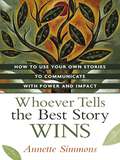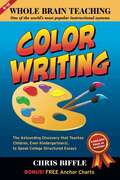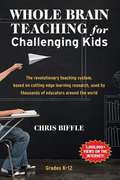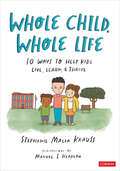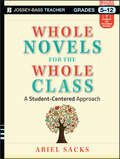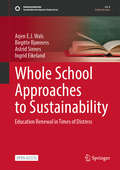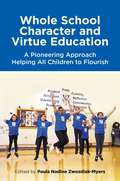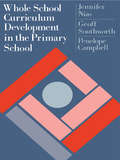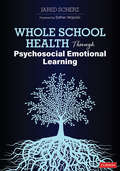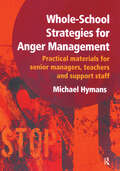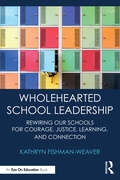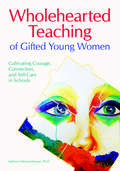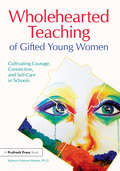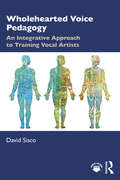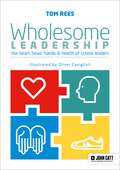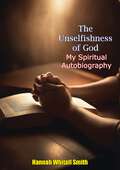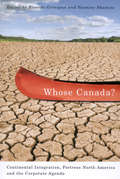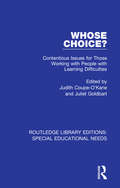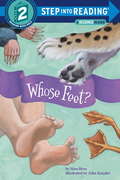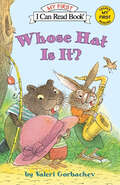- Table View
- List View
Who-Who-Who Goes Hoo-Hoo-Hoo
by Peter SchneiderThis beautifully illustrated storybook has been written for children who stutter and their parents, carers and teachers. It tells the story of a young hedgehog who stutters and his encounters with several woodland creatures, some of whom stutter and others who do not. In the end they all work together to defeat a monster who lurks in the wood. The story makes clear that it is more important to listen to what someone says rather than the way they say it. It offers a positive message to children who stutter and shows other people, both adults and children, how best to react when talking to a child who stutters and the kind of responses to avoid. The book includes information about stuttering for adults and list of relevant organisations.
Whoever Tells the Best Story Wins: How to Use Your Own Stories to Communicate with Power and Impact
by Annette SimmonsStories have tremendous power. They can persuade, promote empathy, and provoke action. Better than any other communication tool, stories explain who you are, what you want...and why it matters. In presentations, department meetings, over lunch-any place you make a case for new customers, more business, or your next big idea-you'll have greater impact if you have a compelling story to relate. Whoever Tells the Best Story Wins will teach you to narrate personal experiences as well as borrowed stories in a way that demonstrates authenticity, builds emotional connections, inspires perseverance, and stimulates the imagination. Fully updated and more practical than ever, the second edition reveals how to use storytelling to: Capture attention * Motivate listeners * Gain trust * Strengthen your argument * Sway decisions * Demonstrate authenticity and encourage transparency * Spark innovation * Manage uncertainty * And more Complete with examples, a proven storytelling process and techniques, innovative applications, and a new appendix on teaching storytelling, Whoever Tells the Best Story Wins hands you the tools you need to get your message across-and connect successfully with any audience.
Whole Brain Teaching Color Writing
by Chris BiffleWhole Brain Teaching, joyfully employed in 100+ countries, presents COLOR WRITING ... the world's shortest, simplest, K-12 writing system! Based upon fifteen years of classroom research, COLOR WRITING's seven games guide students, even kindergarteners, to speak, not write!, five paragraph, college structured essays. Following the included full color patterns, kids advance from speaking declarative sentences, to thesis statements, to compact paragraphs, to tightly organized essays. With rewards for improvement, not ability, COLOR WRITING makes every student a winner. Bonus sections include: weaving text citations into essays, character education paragraphs that build self-esteem and social bonding, free Anchor Charts. Frustrated with complex, boring, impossible to follow, writing programs? Discover COLOR WRITING, the language arts portal to Teaching Heaven!
Whole Brain Teaching for Challenging Kids (and the Rest of Your Class, Too!)
by Chris BiffleWhole Brain Teaching, a grass roots, education reform movement, begun in 1999 by three Southern California teachers, has attracted an astonishing following among educators across the U.S. and in 30 foreign countries. Based on cutting edge scientific research, Whole Brain Teaching recognizes that students learn the most when they are engaged in lessons that involve seeing, hearing, doing, speaking and feeling. Join the revolution! Transform your students from passive receivers of information to dynamic creators of high energy lessons.
Whole Child Education
by John P. MillerPublic education is often viewed as dominated by an emphasis on test scores and narrowly defined parameters of performance and achievement. By contrast, John P. Miller's Whole Child Education fosters relationships between various forms of thinking, links body and mind, and recognizes the inner life of the child.Addressing issues of teaching, curriculum, the school, and teacher wellness, Miller presents three basic approaches (transmission, transaction, and transformation) that facilitate a connection with the whole student. Practical examples from teachers who have incorporated Miller's ideas into their own classrooms and description of Toronto's Whole Child School (founded in 2009) illustrate how the 'Whole Curriculum' can be implemented on both the small and large scale. Inspired by the powerful vision of Martin Luther King and his concept of the Beloved Community, Whole Child Education is a vehicle for building community through holistic education.
Whole Child, Whole Life: 10 Ways to Help Kids Live, Learn, and Thrive
by Stephanie Malia Krauss Manuel Herrera (illustrator)10 proven practices to help children thrive In a world that seems to grow more unpredictable and challenging by the day, how can we increase learning and joy for children while offering them much-needed support? Uncertainty and disruption have created a youth mental health crisis that requires all hands on deck. This urgently needed guidebook offers comprehensive and scientifically-grounded methods you can use to support young people’s well-being, no matter what obstacles they face. Written by an expert with decades of experience in education, youth development, and social work, this timely and timeless resource includes: 10 practices that can prevent and address mental health challenges and enable young people to thrive Strategies for taking care of kids while also taking care of yourself Information on the most pressing issues youth face, from nurturing healthy relationships to building community and belonging Key takeaways and reflection questions for individual use and group discussion as well as "Try Now" sections with tips and tools that can be used immediately Providing essential information, practical advice, stories, and time-tested strategies to help kids live and learn, Whole Child, Whole Life is required reading for anyone who is working with, caring for, or raising young people.
Whole Child, Whole Life: 10 Ways to Help Kids Live, Learn, and Thrive
by Stephanie Malia Krauss Manuel Herrera (illustrator)10 proven practices to help children thrive In a world that seems to grow more unpredictable and challenging by the day, how can we increase learning and joy for children while offering them much-needed support? Uncertainty and disruption have created a youth mental health crisis that requires all hands on deck. This urgently needed guidebook offers comprehensive and scientifically-grounded methods you can use to support young people’s well-being, no matter what obstacles they face. Written by an expert with decades of experience in education, youth development, and social work, this timely and timeless resource includes: 10 practices that can prevent and address mental health challenges and enable young people to thrive Strategies for taking care of kids while also taking care of yourself Information on the most pressing issues youth face, from nurturing healthy relationships to building community and belonging Key takeaways and reflection questions for individual use and group discussion as well as "Try Now" sections with tips and tools that can be used immediately Providing essential information, practical advice, stories, and time-tested strategies to help kids live and learn, Whole Child, Whole Life is required reading for anyone who is working with, caring for, or raising young people.
Whole Novels for the Whole Class
by Ariel SacksWork with students at all levels to help them read novelsWhole Novels is a practical, field-tested guide to implementing a student-centered literature program that promotes critical thinking and literary understanding through the study of novels with middle school students. Rather than using novels simply to teach basic literacy skills and comprehension strategies, Whole Novels approaches literature as art. The book is fully aligned with the Common Core ELA Standards and offers tips for implementing whole novels in various contexts, including suggestions for teachers interested in trying out small steps in their classrooms first.Includes a powerful method for teaching literature, writing, and critical thinking to middle school studentsShows how to use the Whole Novels approach in conjunction with other programs Includes video clips of the author using the techniques in her own classroomThis resource will help teachers work with students of varying abilities in reading whole novels.
Whole School Approaches to Sustainability: Education Renewal in Times of Distress (Sustainable Development Goals Series)
by Arjen E. J. Wals Birgitte Bjønness Astrid Sinnes Ingrid EikelandIn response to urgent global sustainability challenges, Education for Sustainable Development (ESD) and Global Citizenship Education have been prioritized in the United Nations’ Agenda 2030 under SDG 4.7. There is a growing awareness that treating concepts such as global citizenship, sustainable development, climate urgency, and health and well-being as separate subjects or topics to be added to a curriculum is ineffective as they are highly interconnected. Additionally, this approach is problematic as schools already have an overcrowded curriculum. This edited volume brings together a range of scholars and reflective practitioners from across the globe who are investigating and enacting a whole school approach (WSA) in education for sustainability. While the WSA and related approaches, such as those advocated by EcoSchools, are becoming more popular, there is a lack of understanding of their underlying principles and the different manifestations in diverging socio-cultural contexts at different educational levels. This collection of chapters provides a deeper understanding of the WSA, while also addressing its effectiveness, possibilities for upscaling, professional development needs for WSA practitioners, interlinkages with more conventional curriculum requirements, expectations of students and parents, and more. This is an open access book.
Whole School Character and Virtue Education: 192
by David Aldridge Carole Jones David Moran Amanda Wyatt Edith Iwobi Angela Flux Jean-Michel Ballay Elenor PaulUsing the successful implementation achieved at Yeading Junior School, this book provides strategies and advice about how to widely implement character education in schools. This helpful guide answers the following questions schools and teachers have when considering how to develop character education:· What character virtues are important in primary education? · How can these be cultivated within the formal and informal curricula? · How do we know if strategies are working and successful? · What constitutes evidence of best practice? With contributions from professional practitioners ranging from building partnerships in the community, intergenerational learning, using character virtues in work with vulnerable children and children with SEND, financial literacy and the diverse religious context of primary education, the book explores the opportunities for developing character virtues and virtue literacy with the purpose of supporting pupils to flourish in society. With the help of this book, schools can create an environment and ethos where learners are not only successful but can make a real difference to the world.
Whole School Curriculum Development In The Primary School
by Geoff Southworth Penelope Campbell Jennifer NiasFirst published in 1992. Routledge is an imprint of Taylor & Francis, an informa company.
Whole School Health Through Psychosocial Emotional Learning
by Jared Scherz15 strategies to jumpstart student and educator health With rapid technological advancements and changes to how schools must respond to learning and mental health needs, the educational landscape looks considerably different from how it did 20 years ago. How do educators contend with this everchanging future? Jared Scherz answers this question and more by outlining the 15 critical steps to educators’ and students’ health through psychosocial emotional learning. Designed for everyone involved in the educational system—including district administrators, teachers, students, parents, and the business community—this book provides a practical plan with steps to harmonize whole-school health, including sustainable growth in student character development, improvement of organizational health, and reduction of violence and other threats to education. A blueprint of applicable resources is provided, including: • 15 easy-to-follow guidelines for successfully implementing social-emotional learning practices • A spotlight on issues such as empathy, identity formation, self-control, and conflict resolution • Dozens of real-world stories from educators • Anecdotal and data-driven results from successful implementation Educators today must navigate a newer and more dynamic terrain than previous generations. This book provides a practical framework for improving the satisfaction of educators, all through the lens of whole-school health.
Whole School Health Through Psychosocial Emotional Learning
by Jared Scherz15 strategies to jumpstart student and educator health With rapid technological advancements and changes to how schools must respond to learning and mental health needs, the educational landscape looks considerably different from how it did 20 years ago. How do educators contend with this everchanging future? Jared Scherz answers this question and more by outlining the 15 critical steps to educators’ and students’ health through psychosocial emotional learning. Designed for everyone involved in the educational system—including district administrators, teachers, students, parents, and the business community—this book provides a practical plan with steps to harmonize whole-school health, including sustainable growth in student character development, improvement of organizational health, and reduction of violence and other threats to education. A blueprint of applicable resources is provided, including: • 15 easy-to-follow guidelines for successfully implementing social-emotional learning practices • A spotlight on issues such as empathy, identity formation, self-control, and conflict resolution • Dozens of real-world stories from educators • Anecdotal and data-driven results from successful implementation Educators today must navigate a newer and more dynamic terrain than previous generations. This book provides a practical framework for improving the satisfaction of educators, all through the lens of whole-school health.
Whole-School Strategies for Anger Management: Practical Materials for Senior Managers, Teachers and Support Staff
by Michael HymansEnsure your staff and children feel happy and secure in their school environment, with the help of Whole-School Strategies for Anger Management. This book has a much wider perspective than the other more traditional anger management resources available. It considers a whole-school approach, including a tried-and-tested programme with resources for pupils as well as a new ground-breaking staff development element. A facilitator guide, with a programme of activities, PowerPoint presentations and resources, will guide staff in looking at how they manage their strong emotions and how they can help to create classrooms in which strong emotions are handled effectively. Anger can be difficult to manage, but it is an essential part of being human and is a potentially useful emotion. Getting in touch with our emotional intelligence can help us to understand our own anger and to understand children's anger. The book highlights the importance of continually trying to manage our feelings effectively, especially in the roles of leader, teacher, teaching assistant and other support workers. The development of an anger management strategy in a school should be considered as part of a whole-school approach to managing behaviour. Whole-School Strategies for Anger Management will ensure you feel confident to bring about the changes necessary for a happy and secure learning environment. Starting from the premise that managers will structure the process, but that implementation will be carried out by staff, this publication provides training and support at several levels by: recognising the effects of staff behaviour on student outcomes teaching the skills for problem solving, managing conflict and de-escalating angry behaviour understanding the components of anger setting up pupil anger management groups. With a whole-school approach, this resource allows staff to consider the significance of their relationship with students and the various ways that anger can be managed throughout all aspects of school life.
Wholehearted School Leadership: Rewiring our Schools for Courage, Justice, Learning, and Connection
by Kathryn Fishman-WeaverRelationships are the heart of great teaching, great leadership, and our greatest predictor of achievement. This book provides you with the tools and a values-based framework to ensure you’re prioritizing learning relationships and rewiring your school for courage, justice, and connection! Each chapter includes strategies and reflective exercises to guide your leadership work. Written by an educational administrator and researcher with experiences in intercultural and technology-mediated contexts, this exciting new book provides a compelling vision for the complex and evolving landscape of schools. Refreshingly honest and relevant, this book will make you laugh, think, notice, and prioritize what matters most in schools – student and those who support them. It is a must-read title for school leaders and a powerful choice to read with your leadership team.
Wholehearted Teaching of Gifted Young Women: Cultivating Courage, Connection, and Self-Care in Schools
by Kathryn Fishman-WeaverWholehearted Teaching of Gifted Young Women explores the important role school communities play in supporting the social and emotional needs of high-achieving young women. Using a youth participatory action research model, this project follows 20 student researchers from high school through college. This longitudinal study leads to "Wholehearted Teaching," a new framework for cultivating courage, connection, and self-care in schools. Framed with personal stories and filled with practical suggestions, this book offers strategies for teachers, counselors, parents, and high-achieving young women as they navigate the precipice of youth and everything after.
Wholehearted Teaching of Gifted Young Women: Cultivating Courage, Connection, and Self-Care in Schools
by Kathryn Fishman-WeaverWholehearted Teaching of Gifted Young Women explores the important role school communities play in supporting the social and emotional needs of high-achieving young women. Using a youth participatory action research model, this project follows 20 student researchers from high school through college. This longitudinal study leads to “Wholehearted Teaching,” a new framework for cultivating courage, connection, and self-care in schools. Framed with personal stories and filled with practical suggestions, this book offers strategies for teachers, counselors, parents, and high-achieving young women as they navigate the precipice of youth and everything after.
Wholehearted Voice Pedagogy: An Integrative Approach to Training Vocal Artists
by David SiscoWholehearted Voice Pedagogy: An Integrative Approach to Training Vocal Artists investigates how to develop healthy, equitable, student–teacher relationships in both applied and independent voice lessons. Knitting together research from cognitive science, education, mindfulness, and sports psychology, the book promotes a student-centered approach to teaching that gives singers agency over their vocal expression and buoys teacher well-being.Divided into two parts, the book begins by examining the student–teacher relationship. It explores the history of this relationship, analyses contemporary opportunities and challenges impacting students and teachers, reflects on four holistic pillars of teaching, and offers recommendations for developing healthy boundaries and clear communication with students. The second part focuses on fostering a singer’s artistry, covering such topics as selecting repertoire with the student, examining motor skill learning and various practice modalities, cultivating vibrant performances through artistic research, and creating an equitable rubric for assessment. Throughout the book, research is supported by anecdotes and insights from a diverse roster of Western classical, musical theatre, and CCM voice teachers.Synthesized with reflective questions, recommendations for further reading, and a robust online companion, Wholehearted Voice Pedagogy presents an integrative approach to instruction that empowers singing artists and engenders connected, gratifying teaching. This book is a valuable resource for early-career and established voice teachers alike, and offers vibrant resources for vocal pedagogy courses.
Wholesome Leadership: Being authentic in self, school and system
by Tom ReesSpanning the comprehensive perspective of self, school and system, this tour-de-force is both well-informed and uplifting whilst at the same time being full of practical advice and guidance, rooted in the author's front-line role leading a school. Tom Rees's depth of thinking and knowledge of leadership, and his ability to translate that into both a structure and tone that will be relevant to leaders in schools today, will resonate with leaders at levels. The book is brilliantly supplemented with the thoughts and views of colleagues spanning the whole educational spectrum, including: Sir David Carter, Clare Sealy, Daisy Christodoulou, MAT CEOs, Julia Kedwards, Stephen Tierney and Andrew Morrish, plus his very own actual dad!
Wholesome Leadership: Being authentic in self, school and system
by Tom ReesSpanning the comprehensive perspective of self, school and system, this tour-de-force is both well-informed and uplifting whilst at the same time being full of practical advice and guidance, rooted in the author's front-line role leading a school. Tom Rees's depth of thinking and knowledge of leadership, and his ability to translate that into both a structure and tone that will be relevant to leaders in schools today, will resonate with leaders at levels. The book is brilliantly supplemented with the thoughts and views of colleagues spanning the whole educational spectrum, including: Sir David Carter, Clare Sealy, Daisy Christodoulou, MAT CEOs, Julia Kedwards, Stephen Tierney and Andrew Morrish, plus his very own actual dad!
Wholly For God The True Christian Life: The True Christian Life (classic Reprint)
by William Law"Wholly For God: The True Christian Life" by William Law is a timeless and deeply spiritual guide to living a life fully devoted to God. William Law, an influential 18th-century Anglican theologian and mystic, provides profound insights and practical wisdom for Christians seeking to deepen their faith and experience the transformative power of a life wholly surrendered to God.In this compelling work, Law explores what it means to live a true Christian life, emphasizing the importance of wholehearted devotion and a sincere commitment to following Christ. He challenges readers to go beyond mere outward religious practices and to cultivate an inner life that is rooted in love, humility, and obedience to God.One of the central themes of "Wholly For God" is the idea of complete and unconditional surrender to God's will. Law encourages readers to trust in God's providence and to seek His guidance in all aspects of life. He also highlights the importance of loving one's neighbor and living in a way that demonstrates the transformative power of God's grace."Wholly For God: The True Christian Life" is more than just a theological treatise; it is a call to action for believers to live out their faith in practical and meaningful ways. William Law's timeless wisdom and passionate exhortation continue to resonate with readers, offering a path to a deeper and more authentic Christian life.This classic work is essential reading for anyone seeking to grow in their faith and to live a life that is wholly devoted to God. Law's teachings provide a roadmap for spiritual growth and a profound reminder of the beauty and power of a life lived in full communion with the Divine.
Whose Canada?
by Yasmine Shamsie Ricardo GrinspunContributors include Sharryn Aiken (Queen's), Maude Barlow (Council of Canadians), Dorval Brunelle (UQAM), Duncan Cameron (SFU), Bruce Campbell (Canadian Centre for Policy Alternatives, CCPA), Tony Clarke (Polaris Institute), Stephen Clarkson (Toronto), Marjorie Griffin Cohen (Simon Fraser), Kathy Corrigan (Canadian Union of Public Employees), Murray Dobbin (CCPA), Jim Grieshaber-Otto (CCPA), Andrew Jackson (Canadian Labour Congress), Marc Lee (CCPA), Benoît Lévesque (UQAM), Elizabeth May (Green Party), Garry Neil (International Network for Cultural Diversity), Larry Pratt (Alberta), David Robinson (Canadian Association for University Teachers), Mario Seccareccia (Ottawa), Steven Shrybman (Sack, Goldblatt, & Mitchell), Scott Sinclair (CCPA), Steven Staples (Ceasefire.ca), and Michelle Swenarchuk (Canadian Environmental Law Association).
Whose Choice?: Contentious Issues for Those Working with People with Learning Difficulties (Routledge Library Editions: Special Educational Needs #10)
by Juliet Goldbart Judith Coupe O’KaneFirst published in 1996. Three major and topical issues which affect the lives of people with learning difficulties and those who work and live with them are sexuality, integration and age appropriateness. These issues are contentious and controversial and there are no simple solutions. In this book, preconceived, established and sometimes narrow views of what constitutes integration, sexuality and age appropriateness are challenged and a discussion of thought-provoking alternatives are explored from the perspective of the child or adult with learning difficulties.
Whose Feet? (Step into Reading)
by John Kanzler Nina HessMole claws scrape out a new home. A duck uses her webbed feet to flip underwater and search for a snack. Orangutan feet grab on tight as they swing from vine to vine. Who knew that feet could be so special and perform such extraordinary feats!
Whose Hat Is It? (My First I Can Read)
by Valeri GorbachevWhen a little turtle comes across a lost hat, he is determined to find its owner. He asks Mouse, and Rabbit, and even Crocodile if it belongs to them, but they all say it isn't theirs. Whose hat can it be?

